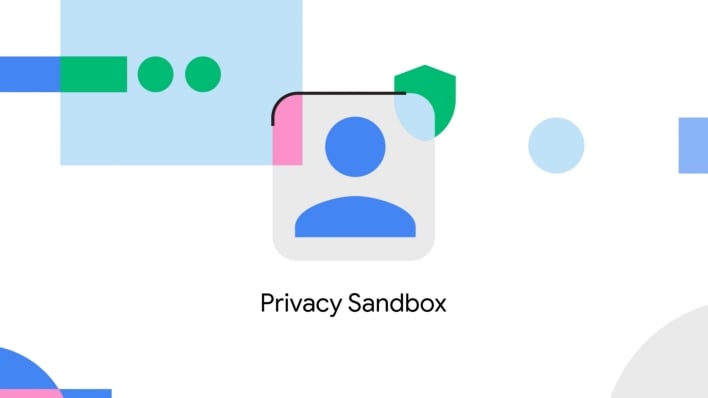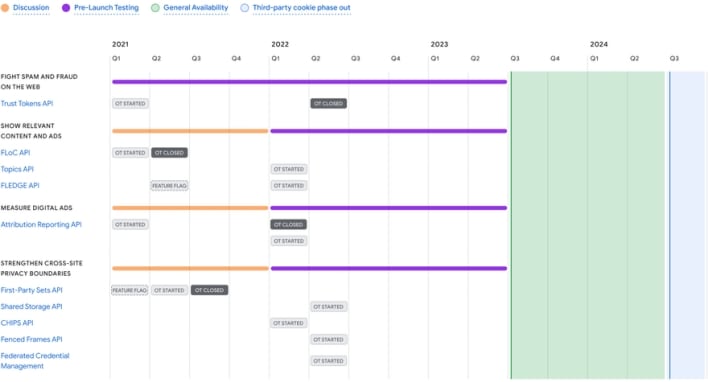Why Google Is Delaying Plans To Block Third-Party Cookies In Chrome

Google announced its Privacy Sandbox initiative back in 2019 with the stated goal of changing the online advertising business that supports much of the web to use more privacy-preserving technologies. At present, online advertising relies heavily on third-party cookies that track users’ behavior across different websites, often without their knowledge or consent. The prevalence and number of third-party tracking cookies has grown over time, making third-party cookies an increasingly large threat for those concerned about privacy and data sovereignty. A recent study found that most government websites serve tracking cookies, which is a particularly concerning finding when it is often necessary to visit government websites to fulfill certain legal requirements or find important information.
Google intends for Privacy Sandbox to provide a number of different APIs that will enable online advertising to shift away from third-party cookies, ultimately culminating in the phasing out of third-party cookies entirely. However, Google has encountered some speed bumps while developing these APIs. The company originally planned to phase out cookies and switch over to its new APIs in 2022, but later pushed the phase out back to the second half of 2023. However, Google met strong resistance to its Federated Learning of Cohorts (FLoC) API, which was supposed to inform advertisers about users’ browsing habits.
Google intends for Privacy Sandbox to provide a number of different APIs that will enable online advertising to shift away from third-party cookies, ultimately culminating in the phasing out of third-party cookies entirely. However, Google has encountered some speed bumps while developing these APIs. The company originally planned to phase out cookies and switch over to its new APIs in 2022, but later pushed the phase out back to the second half of 2023. However, Google met strong resistance to its Federated Learning of Cohorts (FLoC) API, which was supposed to inform advertisers about users’ browsing habits.

The Electronic Frontier Foundation acknowledged that FLoC would do away with the privacy risks associated with third-party trackers, but contended that it would introduce new privacy risks, calling FLoC a “terrible idea.” Aside from privacy concerns, FLoC met resistance from some of the biggest players on the web, including Amazon, which decided to block FLoC across all of its websites. FLoC also drew attention from antitrust bodies who saw it as a means to potentially consolidate online advertising technology under Google’s control.
Google eventually announced that it was abandoning FLoC in favor of a new API known as Topics. This switch to a new API still in development likely delayed Google’s plans for fully implementing its Privacy Sandbox APIs and phasing out of third-party cookies. Anthony Chavez, the vice president of Privacy Sandbox, announced in a blog post today that Google is pushing back the full release of Privacy Sandbox in Chrome and the depreciation of third-party cookies in order to give the company more time to test the APIs.
These APIs are already available for testing by developers, but Google plans to expand user trials starting in early August by enrolling millions of Chrome users in these trials. The number of participants will continue to expand until Q3 2023, when Google hopes to fully launch the Privacy Sandbox APIs for general use. The company will then let some time pass, presumably giving advertisers time to switch away from third-party cookies to these new APIs, before disabling third-party cookies. The third-party cookie phase out is now scheduled for the second half of 2024. We’ll have to see whether Google manages to hit these new time projections or not.
Google eventually announced that it was abandoning FLoC in favor of a new API known as Topics. This switch to a new API still in development likely delayed Google’s plans for fully implementing its Privacy Sandbox APIs and phasing out of third-party cookies. Anthony Chavez, the vice president of Privacy Sandbox, announced in a blog post today that Google is pushing back the full release of Privacy Sandbox in Chrome and the depreciation of third-party cookies in order to give the company more time to test the APIs.
These APIs are already available for testing by developers, but Google plans to expand user trials starting in early August by enrolling millions of Chrome users in these trials. The number of participants will continue to expand until Q3 2023, when Google hopes to fully launch the Privacy Sandbox APIs for general use. The company will then let some time pass, presumably giving advertisers time to switch away from third-party cookies to these new APIs, before disabling third-party cookies. The third-party cookie phase out is now scheduled for the second half of 2024. We’ll have to see whether Google manages to hit these new time projections or not.

